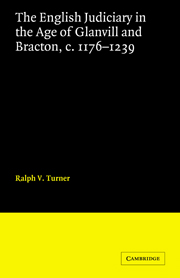Book contents
- Frontmatter
- Contents
- Acknowledgements
- Abbreviations
- 1 THE REPUTATION OF THE ROYAL JUSTICES
- 2 GLANVILL AND HIS COLLEAGUES, c. 1176–89
- 3 THE ORIGINS OF A PROFESSIONAL JUDICIARY IN THE REIGN OF RICHARD I
- 4 KING JOHN'S CORPS OF JUSTICES
- 5 PATTISHALL, RALEIGH AND THEIR COLLEAGUES
- 6 THE WORK OF THE JUSTICES
- Conclusion: The judges and their critics
- Appendix: Royal justices, c. 1176–1239
- Manuscript sources
- Index
- CAMBRIDGE STUDIES IN ENGLISH LEGAL HISTORY
3 - THE ORIGINS OF A PROFESSIONAL JUDICIARY IN THE REIGN OF RICHARD I
Published online by Cambridge University Press: 07 October 2011
- Frontmatter
- Contents
- Acknowledgements
- Abbreviations
- 1 THE REPUTATION OF THE ROYAL JUSTICES
- 2 GLANVILL AND HIS COLLEAGUES, c. 1176–89
- 3 THE ORIGINS OF A PROFESSIONAL JUDICIARY IN THE REIGN OF RICHARD I
- 4 KING JOHN'S CORPS OF JUSTICES
- 5 PATTISHALL, RALEIGH AND THEIR COLLEAGUES
- 6 THE WORK OF THE JUSTICES
- Conclusion: The judges and their critics
- Appendix: Royal justices, c. 1176–1239
- Manuscript sources
- Index
- CAMBRIDGE STUDIES IN ENGLISH LEGAL HISTORY
Summary
THE TWO ROYAL COURTS: JUSTICES ON EYRE AND BENCH AT WESTMINSTER
The pattern of justice in Henry II's last years consisted of frequent circuits of the counties by itinerant justices supplemented with judicial sessions at Westminster during the Easter and Michaelmas Exchequer terms. This pattern was stretched almost out of shape by the strains of Richard I's absence, first on crusade and then in captivity in Germany. Ranulf de Glanvill gave up the justiciarship in September 1189. Richard's changing schemes for government during his absence brought several other changes in justiciars, none of whom had any experience on the bench until Hubert Walter took office in late 1193. Neither of the joint-justiciars named to replace Glanvill came from the ranks of royal administrators; nor did their successor in March 1190, William Longchamp, newly named bishop of Ely. Longchamp was forced from office in October 1191 and replaced by Walter of Coutances, archbishop of Rouen. Walter had long experience under Henry II in the chancery and chamber, but not on the bench. Even had these men brought with them a thorough grounding in English law, they still could not have given full attention to the work of justice in the face of more pressing problems. Walter of Coutances, for example, had little opportunity to send out itinerant justices because most royal officials were busy raising the king's ransom and suppressing Count John's rebellion.
- Type
- Chapter
- Information
- Publisher: Cambridge University PressPrint publication year: 1985

